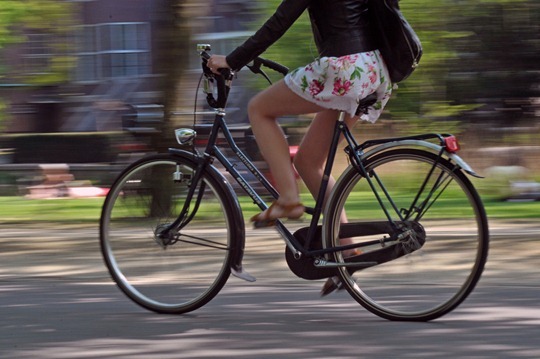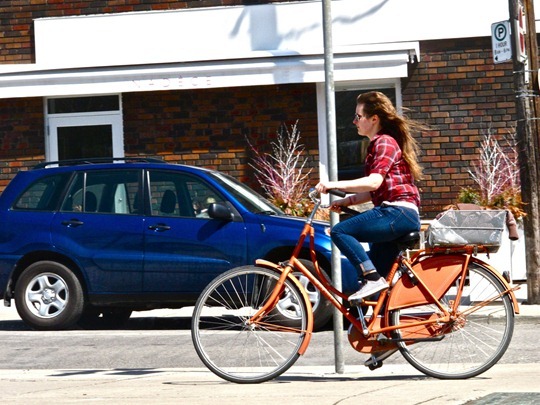
Photo by Marc van Woudenberg / Amsterdamize
Not happy with gas prices? Instead of sitting there and blaming everyone else for gouging you, do something about it. Stick it to the oil companies by not buying gas. Show the oil companies that you don’t need them anyway – and save $3,000 to $12,000 year-after-year.
The woman in the photo above is unintentionally and unceremoniously sticking it to the oil companies. She’s making a statement to show that she doesn’t need to rely on oil to transport herself. She’s also enjoying her subconscious protest, and probably reaching her destination faster anyway.
Instead of taking a stand against big oil like the woman in the photo, us North Americans have a tendency to blame everyone else for our perceived hardships.
A recent post on reddit.com is very telling. The reddit poster laments:
“I just paid $4.21 for gas. The fast food restaurant I usually go to raised their price close to $7. Average cereal price is getting close to $4. At work there are no salary increase, they just tell me I am lucky to have a job. What is going on? I am not happy.”
Many of the ~7,000 comments on this post tell a similar story of unyielding self pity. Meanwhile, the US Government has set up a “task force” to “ensure gasoline consumers are not victims of price gouging”.
Even here in Canada the media is reinforcing the belief that North Americans are “overpaying” for gasoline. A Canadian news outlet reported on a Member of Parliament who declared this to be the end of the “Canadian Dream”. Another outlet highlights the “sacrifices” people are making because of higher gas prices, while also pointing out that “driving is typically the last thing that Canadians will sacrifice (when gas prices are rising)”.
With all of this unrelenting sobbing, it’s no wonder people are outraged.
I can’t think of a better way to take out that frustration and anger at rising gas prices than to make a change in your life to use less gas.

Photo by Marc van Woudenberg / Amsterdamize

Photo by Xander / 416cyclestyle

Photo by Xander / 416cyclestyle
Instead of blaming Libya for our gas prices, why not blame our own lust for large homes and large properties?
Instead of pointing fingers at the oil companies, why not re-assess whether we ourselves really need to contribute so much money into oil companies revenue stream?
Instead of setting up a task forces and subsidizing oil in order to keep prices artificially low, why not invest in infrastructure that makes it easier for people to have alternative choices in transporting themselves?
Thankfully some Europeans injected some perspective in the reddit conversation by highlighting that gas costs $8.60/gallon in the UK. The US has among the lowest gas prices in the world, but you wouldn’t know it from all the griping in the media and reinforcement by the government.
We all have to make tough choices in our lives. But whether you believe you are being gouged at the gas pumps or not, we can all agree that the oil companies don’t deserve our hard-earned money.
So let’s make changes in our lives to stick it to the oil companies.
James D. Schwartz is the editor of The Urban Country. You can contact James at james.schwartz@theurbancountry.com.
Related Articles:
- The World Has Changed. So Can You. (Apr 2011)
- Barriers to Cycling: Debunking the Myths (Nov 2009)
- Billboard Hijacking To Promote Urban Bicycling (March 2011)
- Anonymous Thank You Letter For Bicyclists (March 2011)


I’m not quite sure why everyone is so “anti oil” companies.
Oil companies provide a product which is in demand. We, as consumers, make the decision to continue to purchase it from them, instead of demanding real change. As long as we put off change, we might as well continue to sip from their cup.
Additionally, everyone always screams about how they make “11 billion in profits” a quarter… even if you taxed the entire thing, that’s only 11 billion dollars in revenue for our government. We are how many Trillions in the hole? 11 billion from the oil companies isn’t gonna dent the national debt.
People that are angry about gas prices: “I’m so angry that it costs so much to get me and my 4000 lb vehicle from point A to point B”.
It’s absolutely strange that people think it’s normal to require a transportation device that weighs 25x as much as they do to get from home to work. Yet, when they see a cyclist not wearing a helmet, the cyclist is the weird one.
If people were concerned about gas prices we wouldn’t see things like this:
http://img.photobucket.com/albums/v353/ryanz4/013.jpg
Might be hard to see, but the line-up stretches around the building.
I find it funny how people are still against adding bike lanes or investing in rail (high speed) or other transit options.
Many welcome the future ‘hudak highway’ and widening roads to add more “car lanes” though.
What drives me insane is people will go on and on about gas prices, yet they ignore and shrug off the rising cost of food.
I could be wrong, but I think people need food more then gas!?!
Perspective is everything, I suppose ;). Gas is hovering at $10/gallon in NL (highest in EU). The NL has a long history of high gas taxes, but this doesn’t mean the rising prices aren’t felt by my fellow Dutchies. It’s just part of many carrot-stick policies, which aim to reduce car-use. Key to this is to offer alternatives. Transit in combination with bicycles is one. Urban design is also instrumental.
I use the train to work and I get reimbursed by my employer, he gets tax deduction for doing so. My girlfriend cycles to work every day(8 km) and gets reimbursed for that as well. Incentives go a long way, but need to be seen as added bonus. When provided for in a reasonable manner (infra), cycling to work is a joy.
My disposable income is better for it and goes to much more important stuff 😉
Marc, I’ve heard that before from Mr. Hembrow too – that many Dutch employers reimburse employees if they cycle to work.
Most companies here will only reimburse you if you drive, take a taxi or take transit.
Take my company for example. If I’m visiting a client and I drive there, I can expense ~36 cents per kilometer. However, if I ride my bicycle to that client, I can’t expense anything for the commute.
Funny how this actually creates an incentive for people to drive, because they can potentially profit from their car commute (assuming their car is fuel efficient). The incentives here are indeed designed for motorists.
Small businesses have been hit hard with the oil price increase. Rising gas prices changes the way a company does a business. They might cut back on hiring or close altogether.
business insurance
This is one good reason to learn more about oil and gases. Thank you very much.
This is one good reason to learn more about oil and gases. Thank you very much.
We should use oil whenever it’s necessary and just store it for the mean time and use it if we need it really bad.
We should use oil whenever it’s necessary and just store it for the mean time and use it if we need it really bad.